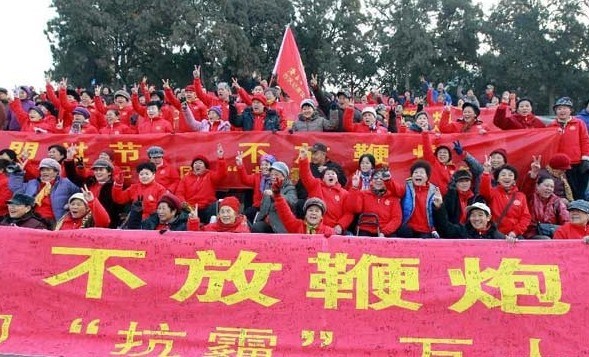

People show the banner calling for a fireworks-free Spring Festival in Jinan, capital of east China's Shandong Province, Jan. 25, 2014.(Xinhua/Lyu Chuanquan)
Less than one week ahead of Spring Festival, fireworks stalls in Chinese cities have seen underwhelming sales, as public concern about air pollution caused by the pyrotechnics has dented demand.
Retail stalls in Chinese cities are required to obtain permits to sell fireworks and are allowed to open only one or two weeks before the Lunar New Year's Eve, which falls on Jan. 30 this year.
In Jinan, capital of east China's Shandong Province, the municipal work safety bureau said the number of stalls that registered for fireworks sales permits this year decreased by 30 percent from the 1,900 recorded last year. It put that down to retailers predicting weaker customer demand.
In the national capital of Beijing, the number of licensed fireworks retailers is also down by 12 percent year on year to 1,178 stalls, which opened for business on Saturday.
Chinese people traditionally light firecrackers and fireworks during the Lunar New Year, hoping the noise will fend off evil spirits and bad luck. People who favor the tradition today believe it adds to the celebratory spirit during the Lunar New Year holiday.
However, with regular bouts of smog hitting China in recent years, the effect of fireworks on air pollution has drawn attention from the public and authorities.
Beijing recorded its highest PM 2.5 reading of over 1,000 micrograms per cubic meter after a firework frenzy on New Year's Eve last year.
The Beijing municipal office on fireworks and firecrackers announced in December that it would issue an emergency ban on lighting fireworks if orange or red alerts for air pollution are issued during the upcoming holiday.
An orange alert means forecasted air pollution of over 300 micrograms per cubic meter for the next 24 hours, or of over 200 micrograms per cubic meter for the next 72 hours.
Residents will receive cell phone text messages notifying them of an alert, and police will be deployed to prevent the public from flouting the ban, said Yu Lianwei, an official with Beijing's public security bureau.
For the first time this year, municipal authorities have also required retailers to record the identity and phone number of buyers purchasing more than five boxes of fireworks. If the customer refuses to give the information, retailers are obliged to refuse sale or sell them a smaller amount.
Posts calling for people not to set off firecrackers are circulating on Chinese social media platforms.
In 2013, China's smog belt stretched from north China's Beijing and neighboring Hebei Province to the Yangtze River Delta near the eastern coast and even to the Pearl River Delta in south China, where smog was seldom seen before. Even the southernmost island province of Hainan and the autonomous region of Tibet recorded smoggy days.
The coastal province of Shandong recorded 120 smoggy days in 2013, surpassing the total number recorded in the previous three years.
Jinan resident Zhang Lu said she likes the tradition of setting off fireworks, "but the air has become really choking during smoggy days. If smog persists during the holiday, I will give up the festival fun."
Copyright ©1999-2018
Chinanews.com. All rights reserved.
Reproduction in whole or in part without permission is prohibited.